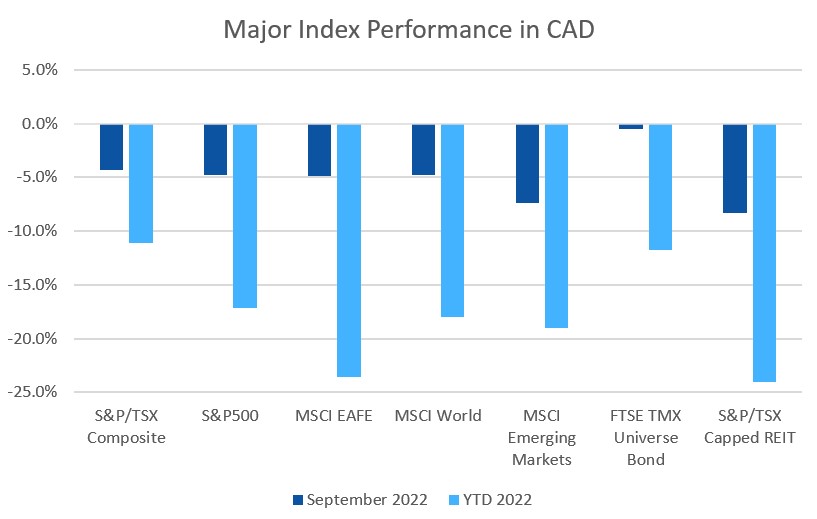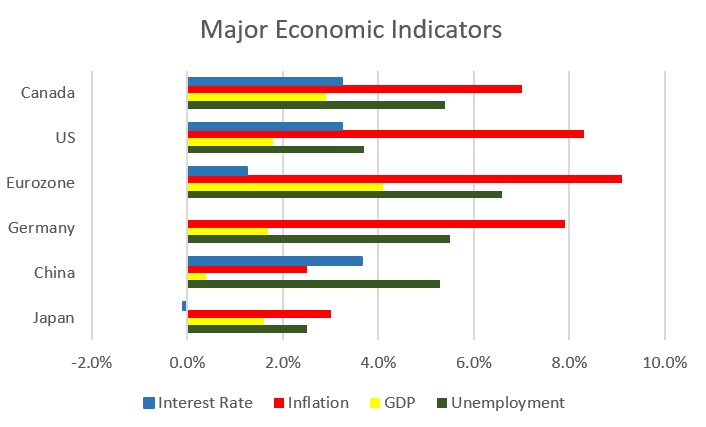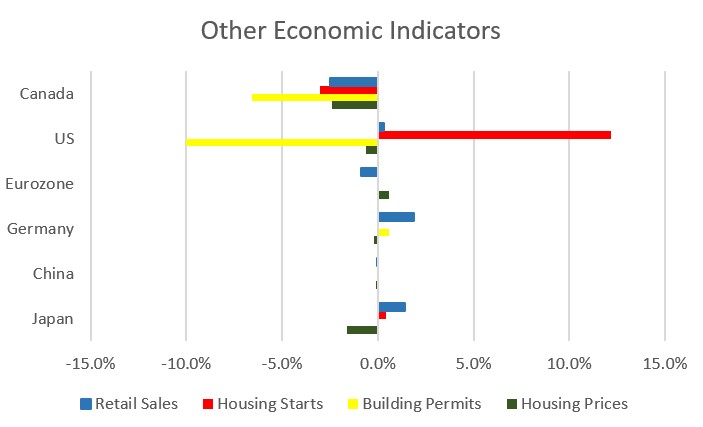September was a follow on of the declines seen in August, as almost everything declined across both equity and fixed income markets.
September 2022 Market Performance
All index returns are total return (includes reinvestment of dividends) and are in Canadian Dollars unless noted.
| Other Market Data | Month-end Value | Return for September 2022 | 2022 YTD Return |
|---|---|---|---|
| Oil Price (USD) | $79.49 | -11.23% | +5.69% |
| Gold Price (USD) | $1,672.00 | -3.14% | -8.56% |
| US 3 month T-bill | +3.33% | +0.37%* | +3.27%* |
| US 10 year Bond | +3.83% | +0.68%* | +2.31%* |
| USD/CAD FX rate | 1.3383 | +2.07% | +5.56% |
| EUR/CAD FX rate | 1.3707 | +4.15% | -4.75% |
| CBOE Volatility Index (VIX) | 31.62 | +22.23% | +83.62% |
*Absolute change in yield, not the return from holding the security.
September was a follow on of the declines seen in August, as almost everything declined across both equity and fixed income markets.
The main index of Canadian stocks, the S&P/TSX Composite, was one of the better performers, declining -4.3%. The S&P/TSX Small Cap was down -7.3%, as the double digit decline in oil prices affected returns in small cap oil and gas companies. US markets, were again among the worst performers: the large cap S&P500 lost -9.2% (in USD), the index of US small cap stocks, the Russell 2000 lost -9.8%, and the tech focused Nasdaq lost -10.5%. The Nasdaq has now lost a third (!) of its value in 2022.
The broad index of EAFE (Europe, Australasia & Far East) lost -6.6% in September, bringing the YTD to -16.6%. Out of the EAFE regions, European stocks performed about the same, losing -6.1% for the month. Meanwhile British stocks lost -5.4%, and Japanese stocks lost -7.7%. Emerging market stocks which were positive in August, lost -9.6% in September.
Bond markets provided little support for diversified portfolios, declining again in September.
The major Canadian bond index, the FTSE/TMX Universe Bond Index lost -0.5% in September, pushing the YTD loss to -11.8%. The FTSE/TMX Short-term Bond Index was essentially flat (-0.05%), and is down -4.7% for 2022. In the US, investment grade and high yield bonds were both down. The ICE BoA AAA index lost -6.2% for September, bringing the YTD loss to -20.9%. The BBB index lost -5.4% for the month. High yield bonds lost -4.0% in September for the HY Master II Index, while the CCC and lower (the real junky stuff) Index was down -5.1%.
Canadian REITs lost –8.3% in September, and are down -24.0% for 2022.
Oil retreated for the fourth straight month, losing -11.3% in September and dropping below US$80 per barrel, but not providing much relief at the pumps. Over the last 4 months oil has declined -31%. Gold lost -3.1% in September, and -8.6% for 2022 so far. The diversified Bloomberg Commodities Index lost -8.3% in September; its still the only index we track that is up more than +5% in 2022, gaining +12.4% so far this year.
In September the Canadian Dollar (CAD) lost ground, declining -4.6% against the US Dollar, and -1.7% against the Euro.
September 2022 Economic Indicator Recap
Below are the readings released in September for the major economic indicators: central bank interest rates, inflation, GDP and unemployment.
Below are the current readings on a few other often followed economic indicators: retail sales and housing market metrics.
A Closer Look at the Canadian Economy
Canada’s unemployment rate climbed half a percent to 5.4% in August, the first increase in seven months. The economy lost 39,700 jobs, as part time job gains of 37,500 offset half of full time job losses of 77,200.
Housing prices across Canada declined -2.4% in August, the largest monthly decline since the Teranet index began in 1999, and the fourth monthly decline in a row. 9 of 11 major markets posted declines, with the largest declines in Hamilton (-5.4%), Ottawa (-3.8%), Halifax (-3.6%) and Toronto (-3.5%). The only gainers were Calgary and Edmonton at +1.3% and +2.8%, respectively. The annual national price gain for the 12 months ended August 31 was +8.9%. Halifax was almost double that at +15.4%.
The level of new housing starts declined -3.0% to 267,400 units in August. Urban housing starts declined -3.0% to 245,700 as multi-family construction declined -4.0%. The value of building permits issued declined -6.6% in July to $11.2 billion, led by a -8.6% decline in residential construction permits. The non-residential sector also declined, falling -2.1% to $3.6 billion.
The inflation rate for August was -0.3%, and +7.0% on an annual basis, further easing from the 39 year high seen in June. Transportation and shelter cost growth slowed, meanwhile costs continued to grow for groceries (+9.8% vs +9.2% in July. Core inflation which excludes more variable items such as gasoline, natural gas, fruit & vegetables and mortgage interest was +5.8%.
Retail sales declined -2.5% in July, the first decline in 7 months. 9 of 11 sectors posted declines; lower fuel prices saw sales at gasoline stations decline -14.2%, sales at clothing stores declined -3.3%, and electronic and appliance store sales declined -2.8%. Compared to a year ago, retail sales were up +8.0%.
Canada’s GDP was up +0.1% in July, with growth in goods producing sectors (+0.5%), slightly dampened by a contraction in the services sectors (-0.1%). Mining, agriculture, and utilities did well, while retail was the largest decliner (-1.9%).
The Bank of Canada raised interest rates +0.75% to 3.25% at the September 7 meeting. With short-term inflation expectations remaining high, expect further (hopefully smaller) interest rate hikes at the next few meetings; the consensus forecast is for the benchmark rate to hit 4.0% by the end of 2022.
*Sources: MSCI, FTSE, Morningstar Direct, Trading Economics



